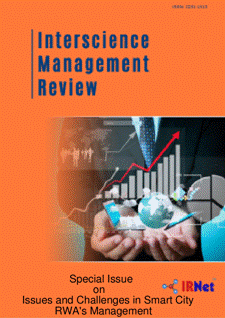Interscience Management Review IMR
ISSN: 2231-1513
Conference
- 3rd International Conference on Computational Finance and Business Analytics (CFBA-2025) 04-05-Apr-2025 IIMT Bhubaneswar
- International Conference on Technologies, AI and Human Rights Development (TAHRD-2025) 17-18-May-2025 IIMT Bhubaneswar
- 2nd International Conference on Disruptive Human Resource Management: Integrating Artificial Intelligence (DHRM-2025) 20-21-Jun-2025 North-Eastern Hill University, Guwahati, India
- International Conference on Digital and Social Marketing: AI Intervention in Digital and Social Marketing (DiSMark-2025) 04-05-Jul-2025 IIMT Bhubaneswar
- International Conference on AI Governance & Human Rights(AIGHR-2025) 25-26-Jul-2025 IIMT Bhubaneswar

Abstracting and Indexing


IMR
Social, Ethical & Legal aspect of RWA (Resident Welfare Association) Management
Soma Mitra
Department Of Human Resource & Communication, Interscience Institute of Management and Technology, Bhubaneswar, Odisha, India
Dhananjaya Sarangi
Birla Global University-Management
Rajendra Bhanj Col.
Interscience Institute of Management and Technology (IIMT), Bhubaneswar, Odisha, India
Srikanta Patnaik
Director, IIMT, Bhubaneswar
Abstract
There has been a sharp rise in the number of highrise buildings in almost all cities during the last 10 years and particularly after the declaration of “Smart Cities” by Government of India. So far as the business and management of infrastructure companies are concerned, it is needless to say that it is an established industry. However, after these high rise buildings become habitable, and are handed over to the housing societies or Resident Welfare Associations (Hereafter referred as RWAs), there are many issues and challenges faced by the apartment owners. The motivation behind the study of social, ethical and legal aspect of RWAs/Housing Societies of India is therefore taken up, and we have carried out some study while managing a society from its day-one management. As on date, RWA management is a complex subject as it covers Security, Hospitality, Soft Services, Support Services, House Keeping, Technical Services such as Lift, Electrical Power and Pest Control Management Services. In fact, these facilities have to be managed with a fixed annual budget, collected through Common Area Maintenance (CAM) charges from all the residents. Many of us have the misconception that managing the society within the stipulated CAM (Common Area Maintenance) charges is the only challenge faced by the RWA office bearers, as collection of service changes is always a challenging issue. However, almost all of us forget to abide by the statutory compliances such as Minimum wages, ESI, EPF and GST rules of the government notified from time to time. In addition RWA should follow the norm of City Development Authority, Fire Safety Department, State Pollution Control Board and other statutory bodies, who issue the compliance certificates for the facilities available in the premises after due inspection, which is a mandatory requirement for community living. Therefore, we have made an attempt to highlight this area, so that more study can be carried out and we can have a better living.
Recommended Citation
Mitra, Soma; Sarangi, Dhananjaya; Bhanj, Rajendra Col.; and Patnaik, Srikanta
(2022)
"Social, Ethical & Legal aspect of RWA (Resident Welfare Association) Management,"
Interscience Management Review: Vol. 5:
Iss.
2, Article 5.
DOI: 10.47893/IMR.2022.1130
Available at:
https://www.interscience.in/imr/vol5/iss2/5